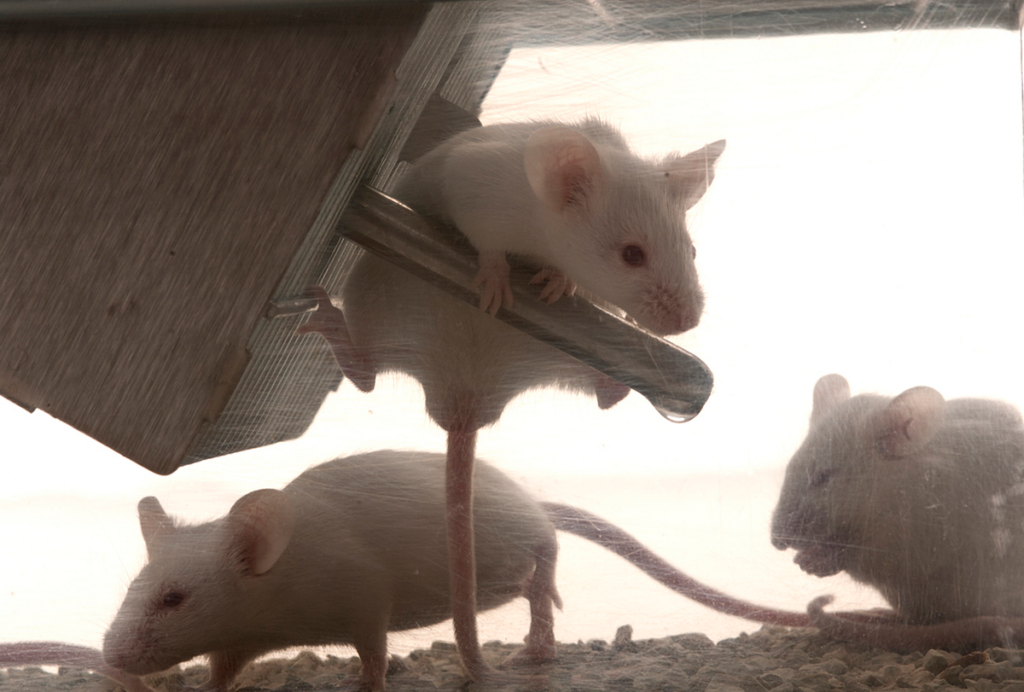Special report: Microglia
Recent articles
Molecular mechanisms: Microglia abnormal in autism brains
Two new postmortem studies show that microglia, which protect the brain from invaders, are denser and more concentrated around neurons in the brains of individuals with autism than in those of controls.

Molecular mechanisms: Microglia abnormal in autism brains
Two new postmortem studies show that microglia, which protect the brain from invaders, are denser and more concentrated around neurons in the brains of individuals with autism than in those of controls.
Immune cells sculpt brain by pruning neuronal connections
Immune cells called microglia may play a central role in trimming synapses, the connections between neurons, according to research published 24 May in Neuron. These modifications are part of a normal developmental process by which excess synapses in the brain are destroyed.

Immune cells sculpt brain by pruning neuronal connections
Immune cells called microglia may play a central role in trimming synapses, the connections between neurons, according to research published 24 May in Neuron. These modifications are part of a normal developmental process by which excess synapses in the brain are destroyed.
Bone marrow transplant alleviates Rett symptoms in mice
A bone marrow transplant from healthy mice to those lacking the MeCP2 protein, which causes Rett syndrome, extends lifespan and alleviates symptoms of the disorder, according to research published online 18 March in Nature.

Bone marrow transplant alleviates Rett symptoms in mice
A bone marrow transplant from healthy mice to those lacking the MeCP2 protein, which causes Rett syndrome, extends lifespan and alleviates symptoms of the disorder, according to research published online 18 March in Nature.
The value of blood cells in autism research
Blood from individuals with autism could help researchers identify biomarkers to diagnose the disorder and learn more about related symptoms, such as gastrointestinal complaints, says molecular biologist Valerie Hu.

The value of blood cells in autism research
Blood from individuals with autism could help researchers identify biomarkers to diagnose the disorder and learn more about related symptoms, such as gastrointestinal complaints, says molecular biologist Valerie Hu.
Networks of genes altered in autism brains, study says
Two networks of genes are abnormally expressed in the brains of people with autism, according to a study published today in Nature.

Networks of genes altered in autism brains, study says
Two networks of genes are abnormally expressed in the brains of people with autism, according to a study published today in Nature.
Scientists capture microglia’s role in brain connectivity
Scientists are changing their minds about the role of microglia, the brain's strongest and most agile soldiers against damage and infection. In healthy brains, microglia help build and eliminate synapses, the junctions between neurons, according to a study published 2 November in PLoS Biology.

Scientists capture microglia’s role in brain connectivity
Scientists are changing their minds about the role of microglia, the brain's strongest and most agile soldiers against damage and infection. In healthy brains, microglia help build and eliminate synapses, the junctions between neurons, according to a study published 2 November in PLoS Biology.
Molecular mechanisms: Autism brains show ‘angry’ microglia
A study of postmortem tissue shows that microglia, cells that provide immune protection to the brain, are altered in the brains of individuals with autism.

Molecular mechanisms: Autism brains show ‘angry’ microglia
A study of postmortem tissue shows that microglia, cells that provide immune protection to the brain, are altered in the brains of individuals with autism.
Rett gene function extends beyond neurons, study finds
Microglia, brain cells that provide immune protection to neurons, may influence the onset and course of Rett syndrome, according to a study published in the Journal of Neuroscience.

Rett gene function extends beyond neurons, study finds
Microglia, brain cells that provide immune protection to neurons, may influence the onset and course of Rett syndrome, according to a study published in the Journal of Neuroscience.
Explore more from The Transmitter
Some facial expressions are less reflexive than previously thought
A countenance such as a grimace activates many of the same cortical pathways as voluntary facial movements.

Some facial expressions are less reflexive than previously thought
A countenance such as a grimace activates many of the same cortical pathways as voluntary facial movements.
Cracking the neural code for emotional states
Rather than act as a simple switchboard for innate behaviors, the hypothalamus encodes an animal's internal state, which influences behavior.

Cracking the neural code for emotional states
Rather than act as a simple switchboard for innate behaviors, the hypothalamus encodes an animal's internal state, which influences behavior.
Alex Maier argues that a scientific explanation of consciousness requires grounding in formalized mathematics
When it comes to discovering laws of nature for consciousness similar to those in physics, Maier argues that integrated information theory is the only game in town.
Alex Maier argues that a scientific explanation of consciousness requires grounding in formalized mathematics
When it comes to discovering laws of nature for consciousness similar to those in physics, Maier argues that integrated information theory is the only game in town.